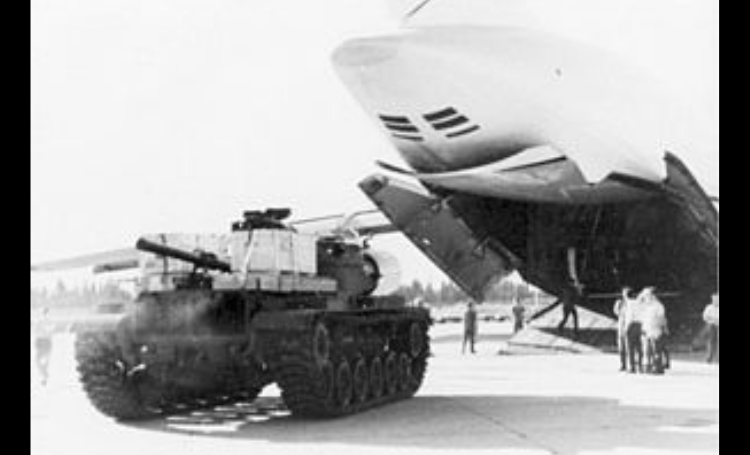Frederick Krantz
Isranet, Apr. 1, 2022
In October, 1973, in the course of the Yom Kippur War Israel, as it ran low on fuel, ammunition, and equipment, was saved from possible disaster by the intervention of American President Richard M. Nixon.
Responding to an emotional plea from Israeli Prime Minister Gold Meir, on October 9 Nixon, overruling his own Secretary of State, Henry Kissinger–who feared upsetting stable relations with the Soviet backers of Egypt and Syria, and was ready to risk Israeli defeat in order to obtain a stalemate which might spur peace negotiations with the Arabs–ordered an immediate airlift of key materiél to Israel.
Since not a single European state would allow stop-over facilities for the long emergency overflights to the Jewish state, a roundabout route to Tel Aviv in what came to be named “Operation Nickel Grass” was quickly established, using the Lajes airbase in the Portuguese Azores as a stop-over refueling point.
22,325 tons of supplies and equipment (and over 150 Phantoms and A4 Skyhawks and other aircraft), would be flown directly to the Sinai front from Tel Aviv. playing a key role in the final defeat of the Egyptians by Gen. Ariel Sharon, and the successful end of the Yom Kippur War,
This history is cogent in relation to the current Ukraine crisis, and to Israel facing Biden Administration support for genocidal Iran and general withdrawal from the Middle East. Insofar as Ukraine is concerned, one must begin with the refusal of the US and Western states to support Ukraine’s plea for admission to NATO after Putin’s invasion of Crimea and Donbas in 2014.
Ukraine had already lost 14,000 combatants when in early 2022, despite pledges of support for Ukrainian independence, the West ignored Putin’s clearly aggressive designs as he amassed 200,000 troops on Ukraine’s borders.
And once the invasion began–fearing a wider war, and Putin’s allusions to the use of tactical nuclear weapon (which note, did not deter Nixon insofar as the Soviet military backers of Egypt and Syria were concerned) –it refused to provide President Zelensky with the defensive weapons he needed to blunt the Russian aggression. Stinger and Javelin and missiles–yes; anti-ship Harpoon and SAM 300 missiles, (Polish-sourced) MiG29 fighters, tanks, trucks, or the backing of a no-fly zone over Ukraine–no.
And despite imposing a strong sanctions regime on Putin, the US and West have allowed him wriggle-room, an ability to continue shipping oil and gas to Germany and Europe (at the rate of $1 billion/day in purchases. And, while acting against key “oligarchs”, they are not yet fully denying Russia access to the crucial SWIFT global monetary-banking exchange system.
Were Richard Nixon in the White House (or, probably, Donald Trump) Putin would perhaps never have dared to cross the border, and if he had, Zelensky would no doubt have gotten his Harpoons, MiGs. SAMs and probably more (Patriot missiles systems, perhaps a “no-fly” zone [or at least a humanitarian airlift] etc.).
The difference between Nixon and Operation Nickel Grass and Biden in relation to Ukraine and Iran is also instructive in relation to Israel.
Under Biden and the Democratic Party’s increasingly progressive and anti-Israel “base”, the U.S., Israel’s single–indeed, only–most important Great Power supporter and ally–is increasingly unreliable. To have allowed the Russians into Syria, and now to be in an unseemly rush to sign renewed JCPOA nuclear deal with Iran, Israel’s main regional enemy, a state supporter of terrorism, is a major, and dangerous, reversal of long-standing Middle East alliances.
Israel, with its shaky coalition government, can no longer count on the White House were push–from, inter alia, Syria, or Hezbollah in Lebanon/Hamas in Gaza, or Iran itself–to come to shove in the region. Instead, it must rely on its own resources, political and military, and seek through its already-established peace with Egypt and Jordan, the (Trump-facilitated) Abraham Accords coalition with Sunni Arab states, and its cultivating of ties with democratic India and others, to shore up its own status as a regional hegemon.
(In 1994, Ukraine gave up its nuclear arsenal, inherited from the Soviets, for a guarantee of its independence by the U.S., Great Britain, and. Russia; Israel’s own nuclear capacity remains a key guarantor of its own self-defence and sovereignty.
It is said that, ultimately, states have interests, not friends. And while sometimes, big fish, for their own reasons, come to the aid of little fish; usually, and sadly so—cf. Czechoslovakia and Poland in World War II, and the Kurds and non-Taliban Afghans more recently–they either gobble them up, or abandon them.
Precisely why Nixon (who in his personal life could be a nasty antisemite) rescued the Jewish state, is a fit subject for another time–but as Volodymir Zelensky surely knows (as the war grinds on, and NATO/U.S. maintain their “no direct intervention” policy), and as Israeli Prime Minister Naftali Bennett may also, one hopes, be coming to understand, Richard Nixons and Operations Nickel Grass are, historically, not the rule, but exceedingly rare exceptions.
(Prof. Krantz is Director of CIJR, and Editor if its Daily Isranet Briefing)


